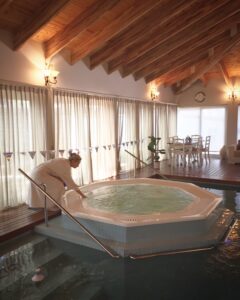The weather has cooled down, the pools have closed, and many of us are setting our sights on fall and winter getaways. At this time of year, what vacation would be complete without a dip in the hot tub and a glass of wine?

While hot tubs can be incredibly relaxing, and relieve muscle and joint pain, keep in mind that they pose many risks that cannot be ignored. Depending on your general health, you may want to steer clear of hot tubs entirely. Even if you are relatively healthy, you should be wary of hot tubs that you do not maintain yourself. This includes jacuzzis at hotels, health clubs, and spas.
Hot tub diseases, by the numbers
The Centers for Disease Control and Prevention (CDC) reported:
- 493 recreational waterborne disease outbreaks from 2000 to 2014.
- These outbreaks resulted in 27,219 illnesses.
- These outbreaks also accounted for eight deaths.
Hot tubs can breed infection – causing bacteria, viruses, and parasites if they are not cleaned and maintained properly.

Bacteria, parasites and viruses, oh my!
The germs in jacuzzis can enter your body through your skin, eyes, ears, or mouth. It can result in various illnesses, such as:
- Skin rashes
- Folliculitis
- Swimmer’s ear
- Diarrhea
- Pneumonia
- Meningitis
What diseases can I contract from being in a hot tub?
In addition to the above list, there are grave, life-threatening illnesses one may be exposed to. It can require a trip to the hospital, medications, and sometimes surgery.
Legionnaires Disease
This past summer, two individuals died after using the hot tub at Zen Day Spa in the city of Richmond, California. A third person became seriously ill but was fortunate enough to make a full recovery. All three spa customers were sick with Legionnaire’s disease, which is a severe form of pneumonia. Legionnaire’s disease is caused by a bacterium known as legionella. Typically, this disease is caught when people inhale the bacteria from water or soil. It can also be spread when the legionella bacteria multiplies in improperly sanitized spa settings. Hot tubs in particular create a favorable environment because legionella multiplies quickly in warm water.

Secondly, the spa jets in the hot tub cause the water to spray small particles into the air. This creates aerosols, which makes it easier to breathe in the bacteria. Also, the aerosol action from hot tub jets works against sanitation, because they make disinfectants break down faster.
Legionnaire’s disease is serious and can lead to a number of complications including:
- Respiratory failure
- Septic shock
- Acute kidney failure
- Death (when not treated promptly).
Pseudomonas aeruginosa
Another bacteria that can infect your body and cause serious complications is Pseudomonas aeruginosa. Pseudomonas aeruginosa multiplies best in improperly-sanitized hot tubs, causing “hot tub folliculitis.” This is an infection of the hair follicles, characterized by itchy red skin, which are sometimes covered in small pus-filled blisters.
Open cuts or sores are particularly susceptible to infection, and a bandage will not keep the germs from penetrating the wound. In most cases, people with a healthy immune system will see the infection clear up in a few days with proper treatment, which typically includes antibiotics. However, for those with a weakened immune system, Pseudomonas aeruginosa can be severe, or even even fatal.

Cryptosporidium and Giardia
Cryptosporidium and Giardia are parasites that can live in improperly-sanitized hot tubs. They typically enter people’s bodies when they swallow water containing the parasites. Both of these diseases are attributed to human waste. What makes Cryptosporidium particularly dangerous is that it cannot be killed by normal sanitizers such as chlorine. Giardia can be neutralized by chlorine, but even in properly chlorinated water, it can survive for up to 45 minutes.
For those who get sick from the Giardia parasite, the signs and symptoms usually appear one to three weeks after exposure. The illness can last up to six weeks.
What are the symptoms of Giardia?
Victims of this illness may experience:
- Watery, sometimes foul-smelling diarrhea
- Soft, greasy stools
- Fatigue
- Stomach cramps
- Bloating
- Gas
- Nausea
- Weight loss
What are the symptoms of illness from the Cryptosporidium parasite?
Those unlucky enough to become infected with Cryptosporidium parasite will typically experience the same symptoms as those infected by the giardia parasite, although symptoms begin much quicker after exposure. They arrive two to ten days after exposure, and the illness will last about one to two weeks.
What virus can I get from a hot tub?
Another unpleasant reality of improperly-sanitized hot tubs is the norovirus. The norovirus is a very common and contagious illness which causes nausea, vomiting, and diarrhea. It is spread through feces or vomit that may be present in the hot tub water. Swallowing water contaminated with norovirus is the most common way the illness is spread in hot tubs. The symptoms of norovirus typically only last about three days or fewer.

How to avoid getting sick when using hot tubs:
If you’re in good health and not pregnant, you don’t have to abstain from hot tubbing. But you must be careful and think ahead. To reduce the risks of getting ill from using a hot tub, follow these safety tips:
- Shower before and after using the hot tub to remove any dirt or germs from your body.
- Keep the hot tub clean and well-maintained. Follow the manufacturer’s instructions for disinfecting and filtering the water.
- Only use hot tubs that you know are clean and well-maintained.
- Avoid hot tubs that don’t look clean or have signs of mold, slime or a film on the sides. Be choosy about your hot tub. If you are unsure about the maintenance or water quality, do not enter the pool or hot tub. “If in doubt, stay out.”
- Make yourself aware of specific to you if you are immune compromised, smoke, are age 50 or older, or have chronic lung disease.
- Do not use a hot tub if you have open wounds, infections, or skin conditions that could spread to others.
- Sit upright: Keep your face above the surfaceand avoid swallowing any water.
- Skip a dip if you’ve been sick: Don’t use a hot tub or go swimming if you’ve been vomiting or have had diarrhea in the past five days.
- Wash up: Thoroughly wash your hands before and after hot tubbing.
- You can maximize your safety if you keep the temperature below 104 degrees Fahrenheit (40 degrees Celsius) and listen to your body.
- Get out if you feel nauseated, dizzy or have a headache.
Taking a few precautions and checking for cleanliness will help you safely enjoy a soak in the hot tub. At Allen & Allen, we want you to enjoy a healthy and relaxing experience when you are out at a day spa, on vacation, or at your favorite recreational facility.
However, if you or a loved one has been injured as the result of negligence in the maintenance of a hot tub or spa, you may be entitled to compensation to recover for your damages. A free consultation with one of our premises liability attorneys can help guide you through the legal process. Call today, at 866-2388-1307.



